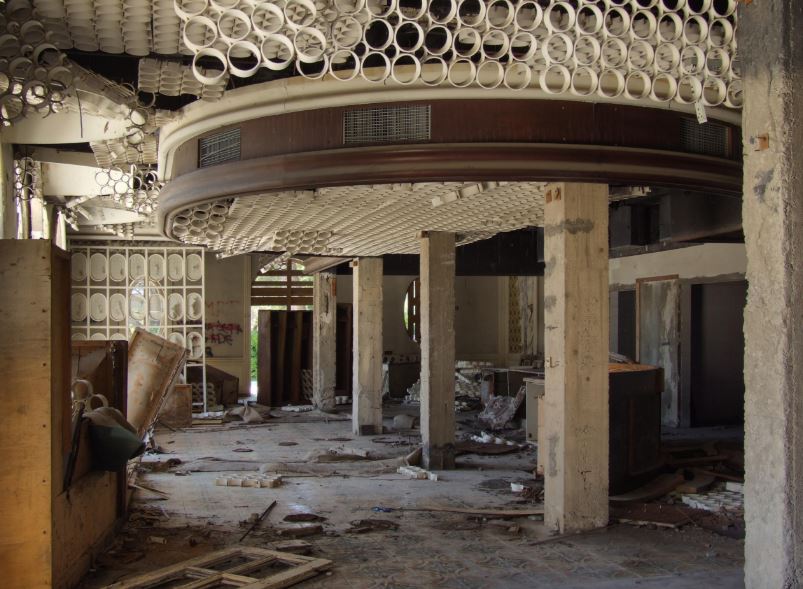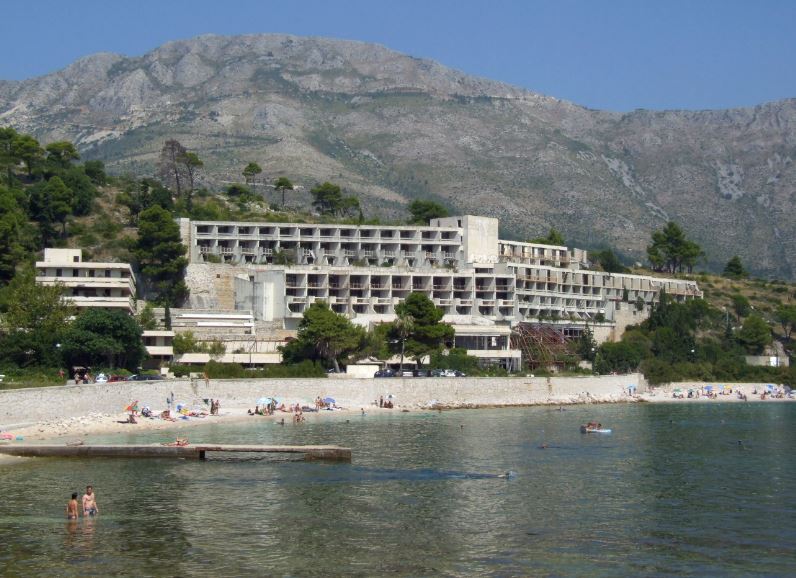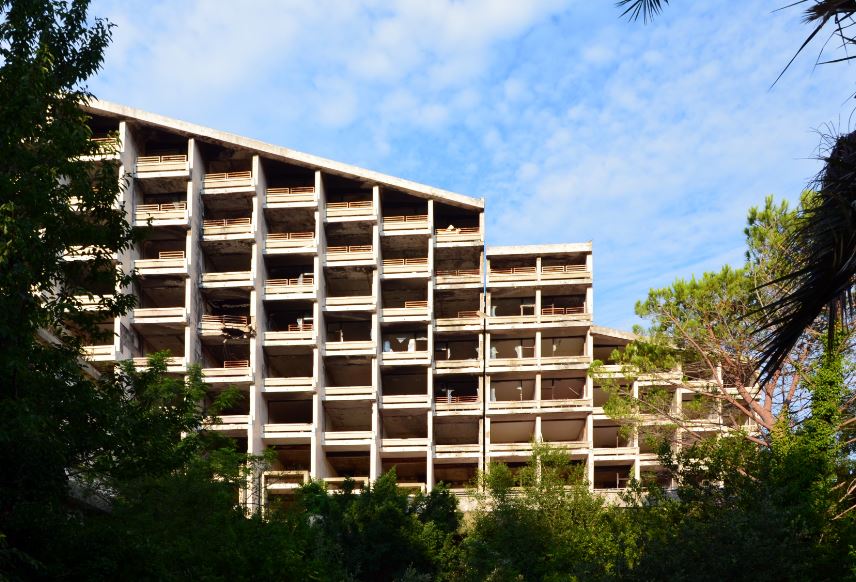Nestled along the pristine coastline of the Adriatic Sea in Croatia lies the once-vibrant resort town of Kupari. This picturesque destination, with its stunning beaches and crystal-clear waters, was a jewel of the former Yugoslavia. However, time and conflict have left their mark on Kupari, transforming it from a thriving tourist destination into a haunting landscape of abandoned hotels. In this article, we will embark on a journey to learn about the abandoned hotels of Kupari, uncovering their rich history, the tragic events that led to their abandonment, and the current state of these remarkable relics.
The Rise of Kupari as a Tourist Paradise
Kupari, a small coastal village situated just six kilometers from the historic city of Dubrovnik, was once a hidden gem that captured the hearts of travelers from around the world. The story of its transformation into a tourist paradise begins in the early 20th century when the charming beaches and natural beauty of Kupari attracted the attention of the Yugoslav authorities.
In the mid-20th century, Yugoslavia, under the leadership of Marshal Tito, embarked on a mission to develop its tourism industry. Kupari became a focal point of this effort, and a series of grand hotels were built along its picturesque coastline. These hotels were designed to cater to a wide range of tourists, from ordinary citizens to political elites and international celebrities.
The grandeur of these hotels, combined with the natural beauty of the Adriatic coast, made Kupari a sought-after destination. Tourists flocked to the area, and the hotels quickly gained a reputation for luxury and hospitality. Kupari became a playground for the rich and famous, where sun-soaked days on the beach were followed by lively evenings of entertainment.
The Golden Era of Kupari
The 1980s marked the zenith of Kupari’s popularity as a tourist paradise. Visitors from all corners of the world marveled at the opulent hotels that lined the coast. Among the most iconic of these hotels were the Grand Hotel, Hotel Goricina, Hotel Pelegrin, and Hotel Kupari. Each of these establishments had its unique charm, offering visitors a taste of luxury and the allure of a coastal escape.
The Grand Hotel, in particular, stood as a symbol of Kupari’s elegance. With its imposing white façade, terraced gardens, and sweeping views of the Adriatic, it was a destination in itself. Guests would revel in the decadent interiors, dine in lavish restaurants, and dance the night away in grand ballrooms. The hotel’s swimming pools, private beaches, and top-notch amenities ensured that every guest had a memorable experience.
The Dark Clouds Gather
However, the idyllic paradise of Kupari was not destined to last. As the 1980s gave way to the 1990s, Yugoslavia found itself engulfed in a storm of political and ethnic conflict. The disintegration of the federation, marked by the Croatian War of Independence, brought chaos and destruction to the region.
Kupari, positioned near the front lines of the conflict, suffered immensely. The grand hotels that once hosted happy vacationers were now caught in the crossfire. The elegant lobbies echoed with the sounds of war, and the lush gardens became battlefields. As the conflict intensified, the hotels were abandoned, their opulence and grandeur replaced by the grim scars of war.
The Abandonment of Kupari’s Hotels
By the mid-1990s, the hotels of Kupari had become symbols of a bygone era. The conflict had left its mark on the buildings, rendering them uninhabitable and unsafe. As the war raged on, there was little hope of restoration. The once-luxurious hotels stood empty, a haunting reminder of the devastation that had befallen the region.
In the years that followed, Kupari became a ghost town. The abandoned hotels, with their broken windows and crumbling facades, became a symbol of the region’s painful past. Visitors who once reveled in the beauty of Kupari now stayed away, deterred by the haunting atmosphere and reminders of the war.
The Post-War Years and Slow Progress
After the cessation of hostilities in 1995, Croatia embarked on a path of reconstruction and healing. While the scars of war ran deep, there was a determination to rebuild and restore the country to its former glory. Kupari was no exception, and efforts were made to revitalize the area.
The process of revitalization, however, has been slow and challenging. The damaged hotels of Kupari posed complex problems. Years of neglect and exposure to the elements had taken their toll, leaving many of the structures in a state of disrepair. The financial burden of restoration was substantial, and there were few investors willing to take on the challenge.
Despite these challenges, there have been some positive developments in recent years. A few of the hotels, such as the Grand Hotel, have undergone limited renovation efforts. These projects serve as glimpses of what Kupari could once again become. The Grand Hotel, in particular, now houses a beach bar and restaurant, attracting visitors who come to enjoy the stunning views and the faint echoes of the past.
The Current State of Kupari’s Abandoned Hotels
As of the present day, Kupari’s abandoned hotels continue to stand as silent witnesses to history. While there have been isolated efforts to revitalize certain structures, much of the town remains in a state of disrepair. The hotels stand as poignant reminders of the past, with their crumbling walls and shattered windows serving as a testament to the resilience of the people who endured the war.
Walking through Kupari today is a surreal experience. Visitors can explore the empty corridors of the hotels, their footsteps echoing through the once-vibrant lobbies. Nature has begun to reclaim the land, with vines and foliage creeping up the facades of the buildings. It’s a haunting beauty, where the contrast between decay and nature’s renewal is stark.
Despite the challenges, there is hope for Kupari’s future. In recent years, there has been renewed interest in the town as a potential tourist destination. Developers and investors have recognized the untapped potential of Kupari’s coastline and the historical significance of its abandoned hotels. Plans for restoration and redevelopment are being discussed, with the aim of preserving the area’s rich heritage while creating a vibrant destination for travelers once more.
The Symbolism of Kupari
Kupari’s abandoned hotels have come to symbolize more than just the ravages of war and neglect. They represent the resilience of the human spirit and the enduring allure of a bygone era. While the hotels may be empty, their walls hold the memories of countless visitors who once found joy and relaxation within their grand halls.
For those who visit Kupari today, it is not just a journey through history but a contemplation of the passage of time. The faded elegance of the hotels stands as a reminder that even the most opulent structures are not immune to the forces of nature and the impact of human conflict.
Visiting Kupari: A Journey Through Time
For travelers interested in exploring Kupari and its abandoned hotels, there are a few important considerations. First and foremost, it is essential to respect the historical and cultural significance of the site. The hotels are not open to the public, and visitors should refrain from entering the buildings to ensure their safety and preservation.
To get a sense of the area’s history and significance, guided tours are available. These tours provide valuable insights into the past of Kupari, its transformation during the war, and the ongoing efforts to revitalize the town. Additionally, they offer opportunities for visitors to appreciate the beauty of the coastline and the potential for future development.
While visiting Kupari, it is also worth exploring the surrounding region. The town’s proximity to Dubrovnik makes it a convenient starting point for exploring this historic city, which is a UNESCO World Heritage site. Dubrovnik’s stunning architecture, ancient city walls, and vibrant culture are a stark contrast to the abandoned hotels of Kupari, offering a well-rounded travel experience.
Conclusion
The abandoned hotels of Kupari are more than just decaying structures; they are a poignant reflection of a region’s tumultuous history and its enduring hope for the future. These grand hotels, once symbols of luxury and opulence, have weathered the storms of war and neglect. While they may stand empty today, they are far from forgotten.
As Croatia continues its journey of recovery and reconstruction, Kupari remains a symbol of resilience and the potential for renewal. The town’s stunning coastline and rich history make it a destination with untold potential, and efforts to revitalize the area are ongoing.
For travelers who venture to Kupari, it is not merely a visit to a ghost town but a journey through time. It is a chance to pay homage to the past, appreciate the present, and envision a future where Kupari’s abandoned hotels once again welcome visitors from around the world.
In the heart of Kupari, amidst the crumbling walls and overgrown gardens, there lies a glimmer of hope. The story of Kupari’s abandoned hotels is not one of despair but of resilience and the enduring spirit of a place that refuses to be forgotten.




